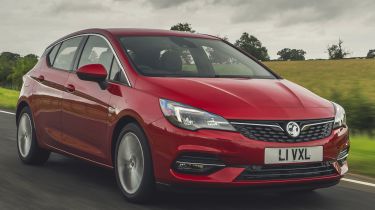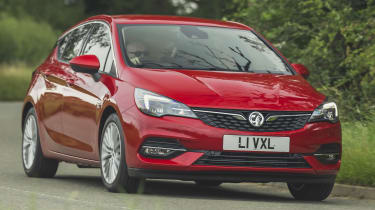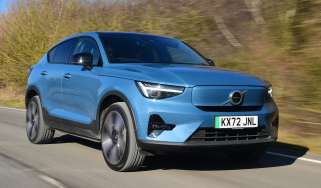Vauxhall Astra (2015-2021) review - Engines, performance and drive
Strong diesel engines and punchy petrols combine well with the Astra's composed chassis

The Vauxhall Astra is built and was developed in the UK – not something that most of its rivals can claim. This means that it’s particularly suited to our roads; the suspension is tuned for imperfect tarmac so ride quality and body control are excellent. Tweaks to the car’s chassis came with the 2019 update but these were fairly subtle – there wasn’t much wrong with the way the old car went about its business.
The recently updated engine range has paid dividends in the way the Astra drives. We’re particularly fond of the diesels, which boast plenty of torque for unruffled acceleration; they’re particularly in-keeping with the Astra’s smooth, well resolved driving experience.
Elsewhere, the slick but slightly rubbery feeling manual gearbox impresses, as do the responsive steering and reassuring brakes. Rather than being a hatchback that only excels when taken by the scruff of its neck, the Astra is a great drive most of the time and remains a quietly competent car.
In corners, the steering feels light and quick, and while there isn’t a lot of feedback, it allows you to make the most of the tenacious grip on offer and place the car easily through bends.
Used - available now

2023 Vauxhall
Astra
14,708 milesAutomaticPetrol1.2L
Cash £15,802
2019 Vauxhall
Astra
22,033 milesManualPetrol1.4L
Cash £10,678
2025 Vauxhall
Astra
32,405 milesAutomaticPetrol1.2L
Cash £15,600
2018 Vauxhall
Astra
40,520 milesManualPetrol1.4L
Cash £7,299What may surprise you is that the car is as rigid in its sportier settings – SRi models and above sit on the same chassis settings as other cars, with only wheel and tyre combinations making a slight difference to the ride and handling balance. For the record, we’d be very happy with an SRi model, with a ride that is composed and much more compliant than its predecessor’s.
You’ll feel bumps, but the dampers take the edge off them nicely and control the body tightly so you can carry speed in total safety. This also means the Astra is a quiet and refined cruiser, and there’s little wind or road noise at motorway speeds.
Overall, the Ford Focus is the better driver’s car and a Volkswagen Golf is more polished – but ultimately there will be little to complain about in the way the Astra drives for most.
Engines, 0-60 acceleration and top speed
The Astra’s engine range was reworked in 2019 to improve emissions, fuel economy and performance across the board. There are four petrol engines and two diesels to pick from, available in conjunction with a six-speed manual, nine-speed auto or a CVT depending on which you go for.
A trio of turbocharged 1.2-litre three-cylinders headline the petrol range, producing 108bhp, 128bhp and 143bhp.
There’s a 1.4-litre three-cylinder too, producing an identical 143bhp to the highest-powered 1.2-litre engine, but with more torque and fitted exclusively with a continuously variable transmission (CVT). Low emissions should appeal especially to fleet users, while 0-62mph times around the nine-second mark mean it’s no slouch.
Our preferred engines are the diesels, badged Turbo D and producing either 104bhp or 120bhp, from a 1.5-litre turbocharged three-cylinder. We tried the more powerful of these and found it a perfect fit; its smooth character and torquey delivery tally up nicely with the car’s well-sorted chassis. You can have it with a six-speed manual or an excellent nine-speed automatic if you prefer. The more powerful models are able to crack 0-62mph in just under 10 seconds.





